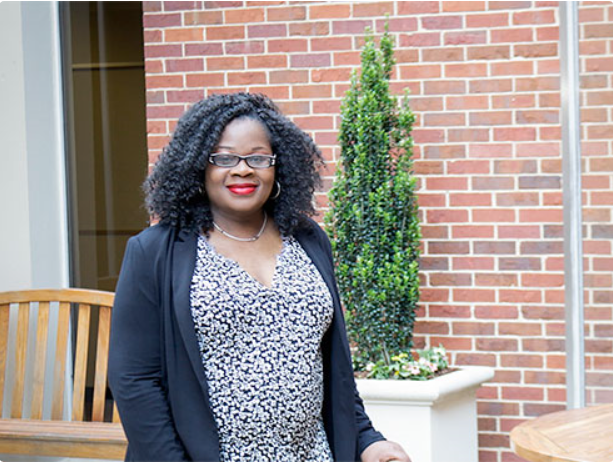By Adam Pope
UAB News

Spirituality plays a central role in many aspects of African-American culture, and University of Alabama at Birmingham School of Nursing postdoctoral scholar Deborah Ejem, Ph.D., will explore how significant a factor it is in the relationships among patients with chronic illnesses and their caregivers and clinicians.
The two-year, $187,293 diversity supplement award from the National Institutes of Health’s National Institute of Nursing Research adds to the five-year, $3.5 million NINR R01 parent grant, “ENABLE: CHF-PC (Comprehensive Heartcare for Patients and Caregivers),” awarded to Ejem’s mentor, School of Nursing Professor and Marie L. O’Koren Endowed Chair Marie Bakitas, DNSc.
Ejem will conduct qualitative interviews with “ENABLE: CHF-PC” African-American study participants and combine that information with questionnaire data that is already being collected as part of the parent study to closely examine two areas.
One focus of Ejem’s study will be on how African-American heart failure patients and their family caregivers use spirituality to ease the burden of care on the caregivers and improve the quality of life for the patient. Another will assess how the participants include spirituality as they interact with their clinicians during the course of the patient’s care.
“I have personal family friends who are caregivers for people who are seriously ill,” Ejem said. “As I talk to them about how they are coping, often they talk about how important religion is to them, how they use prayer and how it all helps them even in the most difficult of situations. I expect I will find a strong connection with religion and spirituality in those dealing with life-threatening illnesses.”
Ejem cites an American Journal of Cardiology report from 2011 that indicated African-Americans living in the rural South have the highest burden of illness from heart failure, as well as various reports that indicated they are the least likely to receive potentially beneficial palliative care services. They are also unlikely to engage their clinicians in conversations about spirituality and the role it plays in their ongoing treatment.
Ejem says that, while conversations about faith can be awkward in medical settings, they can benefit the patient.
“Many members of the African-American community, especially the older adults, rely on spirituality extensively,” Ejem said. “It is especially important to this group that we build this spiritual literacy within the medical community.
“Understanding how patients would like for their clinicians to talk to them about their spirituality and religion as part of their heart failure care is one of the main goals of this study.”
As part of the “ENABLE: CHF-PC” study, half of the heart failure participants will receive the intervention, which includes a series of phone sessions with a nurse coach. Data is collected every eight weeks for 48 weeks, which includes a series of questions about their spiritual coping, their quality of life, symptom management and the type of relationship they have with their caregivers.
Ejem will identify 10 to 15 caregiver-heart failure patient dyads — two individuals maintaining a sociologically significant relationship — to participate in an additional one-time phone interview to gather more in-depth data about her study issues.
Over the course of the nearly hour-long interview, she will ask both the patients and the caregivers specific questions about their relationships, their religious and spiritual practices, and how they would like doctors to speak with them about their spiritual and religious beliefs.
“Improved communication is key, and I think this is one step in helping clinicians better understand their patients’ needs,” Ejem said. “If we are gearing toward more patient-centered outcomes, and we want patients to subscribe to a self-care model, we have to know what’s important to the patient. Spirituality is important, especially where we live here in Alabama, and we have to address that fact in providing the proper health care for these patients.




